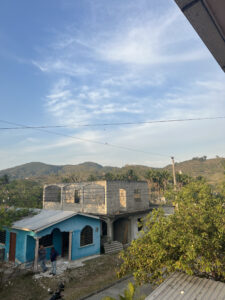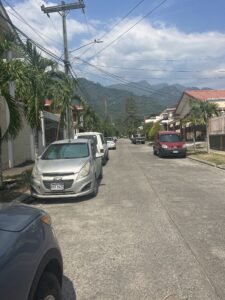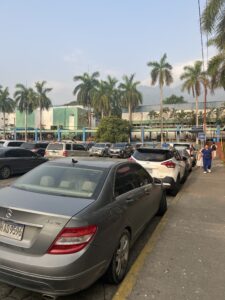Research Blog
Trinity’s Center for Caribbean Studies supports research projects by students, faculty, and staff related to / based in the Caribbean region through grants and fellowships. Starting in AY 2023-2024, such grants will be followed by a blog.
Anthropology major Kathy Miranda (Class of 2024) offers our inaugural blog submission on her spring break fieldwork in Honduras.
All photos were taken by the author.
 Hello everyone! My name is Kathy Miranda. I’m currently a senior studying anthropology on a pre-medical track with interests in health education and public health policy.
Hello everyone! My name is Kathy Miranda. I’m currently a senior studying anthropology on a pre-medical track with interests in health education and public health policy.
As I was thinking about possible topics of research for my honors thesis in spring 2023, I reflected on my experiences as a Honduran and a college student that had led to my personal commitments in how health, illness, and disease are understood, experienced, and informed by cultural, socioeconomic, sociopolitical, religious, and historical influences.
The global pandemic, COVID-19, immediately came to my mind as I observed the ways in which my Honduran family—both extended and immediate—behaved and responded to vaccine mandates, medical information, and restrictions. I noticed a general pattern of distrust, hesitancy, or complete negation. I began to consider the possible sources of their medical knowledge and the range of factors that might impact their medical decision-making. This led me to a larger curiosity of how power and gender manifests within Latino homes, specifically in Honduran homes where religion and patriarchy can historically be major players.
To offer some context, during the height of the pandemic, it was most often my female family members conducting and maintaining contact with family as well as, obtaining and disseminating medical information and remedies to other female family members whereas my male family members were virtually left out of these exchanges. Such interactions reminded me of a saying commonly used to explain the gender performance and the distribution of social roles within Latino culture which states, “Las mujeres son de la casa y los hombre son de la calle” meaning, “Women are from the home (belong to the home) and men are from the street (belong to the street). In other words, women traditionally are thought to govern the realm of domesticity and private spaces: the home and those living within the home while men govern public spaces. In context of medical anthropology, the mother then emerges as a major source of influence in the home extending so much so over even the medical decision-making of her adult children.

With this, I explored the infrastructures of honor, faith, and tradition that upholds and sustains Honduran culture and society.
Mothers might direct not only the decision-making but also the bodily autonomy, and identities of their children. Such intergenerational ritualized behavior is often explained through phrases like “that’s the way it’s always been”. This sacrifice of self can be understood as an exchange of reciprocity, I argue—the mother is expected to sacrifice herself for her children with her children as her life and they in turn recognize this sacrifice and exchange the devotion that they saw modeled to them as children.
A phrase that stuck with me from one of my interviews was, “Siempre, cuando considero y tomo una decisión, pienso en cómo se reflejará en mis padres; nunca escuchas que fulano hizo tal y tal; no, siempre es, ‘escuchastes que hizo el hijo de fulano’” meaning, “Always, when considering and making a decision I think about how it will reflect on my parents—it’s never, did you hear so and so did this—no, it’s always so and so’s kid did this.” Family connections are inescapable.
Faith could also be a powerful influence. While, in Honduras for fieldwork, I visited a public hospital in which I conducted interviews with medical personnel who described situations in which a patient—usually female—would deny any medical intervention—interpreted as a fear-informed decision by medical staff—out of belief that God would intervene and provide divine healing. Here, one’s agency could be displaced by faith in the process of a patient understanding a medical diagnosis and accepting recommended medical intervention and treatment.
Women, as both patients and caregivers often relied on faith and folk healing in lieu of Western biomedicine. This was often the case when there were gaps in their knowledge and understanding of a prognosis, diagnosis, treatment, or prescription— especially when women felt disregarded by their medical team.
My ethnographic informants evidenced the ways in which Honduran women might act from a standpoint of suspicion as a protective measure of survival in moments of crisis. Many of my female participants believed their well-being and safety could only be ensured by hypervigilance and alternative practice. Their beliefs permeated in both their own medical decision and their influence on those closest to them in the home.
Though beyond the scope of this blog, individual suspicion of Western biomedical practices arises in response to broader forces of political instability, corruption, impunity, and structural violence in Honduras. Health is often weaponized as a political tool. As one informant commented, “An uneducated population and a sick population is easier to control.”
To conclude, in Honduras, female power exists as a dominant influence in the home over generations and over the bodies and minds of their children. Influence is upheld by tradition, honor, and faith and materialized beyond the home during medical decision-making.

